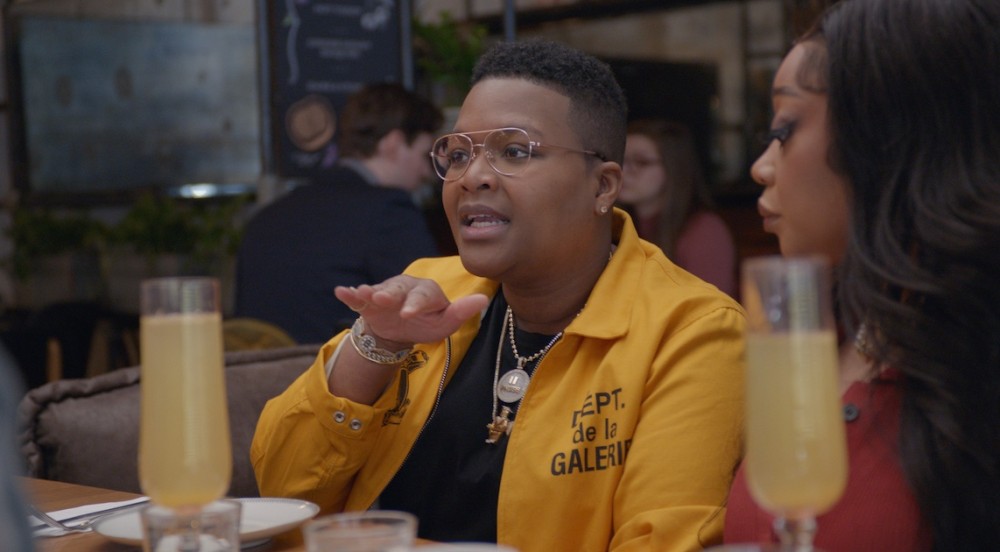With her unapologetic truth-telling, her hilarious takes on controversial subjects and her ability of always being true to her authentic self, Emmy-winning writer and stand-up comedian Sam Jay is comedic brilliance at its finest. Since 2017, she’s been on the writing team of Saturday Night Live, becoming the first Black lesbian writer in the show's history. In 2020, she released her Netflix comedy special 3 in the Morning. She also co-created the cutting-edge comedy series Bust Down with Langston Kerman, Jak Knight, and Chris Redd, which premiered on Peacock this past March.
Her late night talk show Pause with Sam Jay is back for a second season on HBO. Created by Jay along with Prentice Penny, the showrunner for Issa Rae's Insecure, the show dives into unfiltered conversations about racism, sexuality, relationships and heteronormativity in an informal setting. In an era of polarization, Jay sets out to listen, learn, and ask questions to those with different perspectives, while offering her own, through the lens of comedy.
EBONY spoke with Sam Jay about the challenges facing stand-up comedians, Black queer identity and the inspiration behind her comedy.
EBONY: As a child did you always know that you were funny?
Sam Jay: I don't know ifI always felt like I was funny but I knew I was witty. I think my humor grew over time. I got in trouble a lot and had problems with authority, for sure. We did a whole episode about it on the show.
Traditionally, stand-up comedy is a male-dominated space. As an openly gay Black woman, did your identity add to any of the discrimination you encountered on the stand-up circuit?
There wasn’t anything that was too crazy. I think comedy can be a boys club sometimes, and you have to kind of muscle your way into it. But it wasn't anything really crazy that I remember. Just the usual BS you have to deal with.
As a stand-up comedian, would you say that your brand of comedy is conversational?
I think that’s always been my approach and it makes for good comedy because the comedians that I like, they talk about the things that most people don't necessarily want to talk about, or at least don't want to talk about on "front street." They say the things that you're not supposed to say to try to bring the challenging conversation to the forefront. So, I've always liked comedy like that and I think my style is just molded that way.
I always ask comics this: If you could only choose between writing, doing stand-up, or acting, which one would you choose?
That's hard because I think I've grown to like them all for different reasons and they all do something different and allow me to be creative in different ways. I enjoy all those options. But I guess if I had to live and die with something, it would be stand-up,
With the recent Will Smith/Chris Rock incident and Dave Chappelle being attacked at the Hollywood Bowl, as a comedian, what is your view on these interactions?
I feel like we're in different times and people are very alert about what's going on and what's being said. Stand-up as an art form is typically the opposite of that, and it will figure itself out eventually. I can't say that people are wrong for feeling the way they feel but we’re in different times and everything will have to adjust.
When I first caught Pause last season, I loved that it looked like a bunch of friends hanging out and having conversations. What was the creative process behind using this as a format for the show?
I just wanted to make a show I hadn't seen before that was about having the conversations that I was having in actual life that wasn’t being displayed anywhere on TV. So I tried to make what I would want to watch.
On the show, you're not giving lectures but you’re listening to other viewpoints over drinks. That's how organic conversations emerge, and it's a great way that we can talk about topics that we wouldn't normally talk about.
I completely agree. It just gives you a more natural and emotive environment where people are more honest. When you sit at a desk and you sit someone across from you, people will think about talking points and not just about how they actually feel. I mean, when you present the mess and the messiness, and you're not trying to give the best answer but an honest answer, I feel like you can connect with more people.
The first episode of season two is about thinking of homosexuality as being intersectional. You mention that spaces such as GLAAD and PRIDE events don't connect with all the facets of the Black queer experience. What inspired you to open the season with those discussions?
I think it’s a conversation that you don’t always hear publicly but is happening with Black gay people all the time behind closed doors. I think that was something that needed to be brought to the forefront and needed to be brought to a larger discussion about Black people, queerness and our relationship with the gay community. Black people are always under the scrutiny of being more homophobic than any other group. That and a lot of other stuff that I have been hearing over the last year was just getting on my nerves.
Lastly, when all the episodes air, what do you want viewers to take away from season two?
I hope to bring some perspective and add something that maybe they didn’t consider when they were thinking about these things or having conversations about these things by showing all these different people with these real-world experiences. I hope the show can bring another layer and perspective to what they already had.













